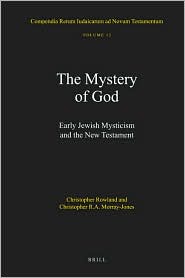
Christopher Rowland, “Things into Which Angels Long to Look: Approaching Mysticism from the Perspective of the New Testament and the Jewish Apocalypses,” in Christopher Rowland and Christopher R. A. Morray-Jones, The Mystery of God: Early Jewish Mysticism and the New Testament (CRINT, vol. 12; Leiden and Boston: Brill, 2009), pp. 1-216.
In this study Christopher Rowland provides an outstanding survey of apocalypticism in the New Testament (NT). Rowland is to be commended for presenting a thorough argument in favor of the permeation of apocalypticism in New Testament theology. Instead of a limited focus on apocalyptic eschatology, Rowland capitalizes on the theme of the volume by analyzing apocalypticism in its “mystical” aspects. Following Hengel’s definition of apocalypticism as the search for “higher wisdom through revelation,” Rowland is keen to highlight visionary experience(s) and developed angelological and merkavah themes. Thus Rowland seeks to establish the apocalyptic origins of Christianity (á là Schweitzer) by conceptualizing apocalypticism along its (Jewish) mystical axis.
